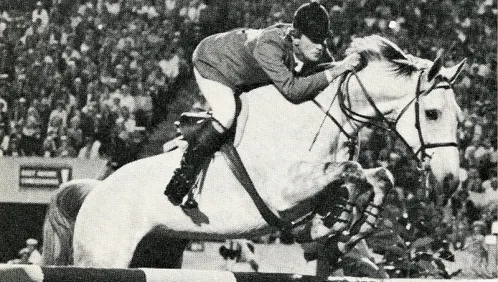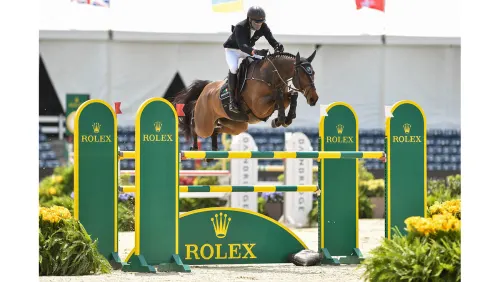Our columnist expresses her frustration with the committee process and wants dedicated association volunteers to have a bigger say.
After serving on American Horse Shows Association, U.S. Equestrian Federation and U.S. Hunter Jumper Association committees for more years than I can count, I’ve started to take a step back and think about our job as committee members. Why do some of us keep volunteering, giving our time, paying to go to retreats and conventions, and joining in conference calls?
We do it because we’re dedicated to the sport and we want to give back. We want to make our sport better. We want to make things better for future generations.
In order to make this happen we need to start working as a team with a sense of community and much better communication in terms of USHJA and USEF committees.
Whoever came up with the idea of using people who are out in the field every day teaching, training, judging, riding and making all of it happen, putting these people on committees—where their expertise can be put to good use—was a genius. But those committees must be allowed to do their jobs.
The committees don’t have a great reputation for getting things done because of the layers of association government and red tape by the boards and executive committees,
officers and “the powers that be” of USHJA and USEF. It seems that USHJA and USEF vote against these recommendations without taking the time to understand them. Why not go back to the committee and ask questions instead of just saying no?
Work With The Shows
Horse show managers are for the most part considered the enemy, yet they are the ones bringing in the dues and a great deal of income each year. Why are we not listening to these successful businessmen and women?
The show managers are viewed as outsiders. Some people seem to think that these show managers should put on shows for the betterment of an organization, not to make money. I’m not sure how that concept came to be.
There are so many shows all over the country. Each year shows seem to pop up despite the mileage rule. And remember the growth of the unrecognized circuits. Those circuits are run by people who are listening to the masses. They have the same jumps, courses and judges as USEFrated shows (sometimes nicer). These shows award yearend coolers, trophies and other prizes. For the Horse of the Year, the USEF now just gives a ribbon. The Zone awards are also ribbons instead of coolers and trophies. The USEF dues go up, yet the top awards offer fewer prizes.
When Tom Struzzieri’s Horse Shows In The Sun team put an enormous amount of money in the jumpers and hunters, the rules started to change. Soon those classes will be driven out of USHJA and USEF hands. Why not work with the HITS team instead of against them? This team is rewarding their customers—a concept which “the powers that be” have fought against. Why?
ADVERTISEMENT
We as committee members and board members and officers of both organizations need to
learn from people who are a success! The best leaders surround themselves with people who work hard and keep their ideas innovative and fresh—and who communicate! When you’re in a position of any kind in a non-profit, you must answer emails and phone calls. Ignoring them makes issues grow out of proportion, and many times anger develops and fighting begins.
Listen To Committees
All committees must know the financial bottom line of any new or old projects or finals. The boards need to provide the committees with this information, and the boards and officers must listen to these committees and work with them.
All of us understand the need for checks and balances on all sides, yet the majority of committee members work too hard and give too much time to have their ideas and opinions ignored or changed by “the powers that be.”
Instead of just changing a rule or a proposal or an idea, it would be nice to send it back to the committee with questions. Otherwise, committees become frustrated and throw up their hands. When committees have worked hard on a project, the boards should ask questions if they don’t understand the concept. Don’t just turn it down or change it without a discussion with the committee that proposed it.
Locating Junior Hunter Finals
One example of committee work not being respected is the issue of USEF Junior Hunter Finals. These finals were the vision of Don Stewart and the USHJA Junior Hunter Task Force. The committee has worked hard to make this a special event.
In 2010 the committee voted unanimously to have the finals held in one place, and then it was changed to Kentucky without the committee’s approval. In the fall of 2011 the USEF informed the Junior Hunter Task Force that the finals were losing money and they were being moved to Harrisburg during the Pennsylvania National Horse Show.
We were told that it was “a done deal.” Mind you, this was after the 2012 qualifying year had begun, and the West Coast Junior Hunter Finals were to be cancelled.
After recovering from the shock, we asked how Harrisburg could fit this important event in their schedule.
Turns out that it was not a “done deal.” In the past, the Junior Hunter Finals had been put out to bids, and the Junior Hunter Task Force would weigh the choices to come up with the best choice and the best bid. These bids should be the best for the exhibitors, the horses and the host manager who could financially make it work.
ADVERTISEMENT
Then we were told that the Junior Hunter Finals would now be held on the West Coast and the Junior Hunter East Coast Finals would go to Lexington, Ky. I love Lexington, but all the finals cannot be held there! Now we have USEF Pony Finals, ASPCA Maclay, the new national young horse championships, FEI North American Junior and Young Rider Championships, USHJA Hunter Derby Finals, and USEF Junior Hunter Finals, almost all held in August in Kentucky.
Have “the powers that be” thought about how this affects the rest of the shows across the country? Does it make these finals special, and is it fair to all the exhibitors?
No More Red Tape
In her story “Investing In The Young Hunter: What We Can Learn From The Reining World,” on p. 24 of the Chronicle’s Jan. 31, 2011, issue, Colleen McQuay laid out a pre-green proposal which she and the Open Hunter Task Force have worked on tirelessly for the last three years. It’s been kicked back to Colleen’s hunter subcommittee time and time again.
Colleen has already put together a similar program in the reining world, which is now worth millions of dollars for the owners. She has a formula that could lead into our hunter programs and to our international derby programs, which has hit obstacle after obstacle, red tape and bump after bump. This formula is for the owners, the horses and the development and future of our hunters. This is modeled after a program that works!
Joey Darby originally gave us great input on the idea and has sponsors waiting in the wings. Horse show managers are not waiting for the red tape; they’ve already started similar programs on their own. Once again, USEF and USHJA will be standing in the dust, wondering how to stop another program!
When USHJA started, we were supposed to be the voice of the hunter (and jumper?) community. We were all excited!
Today, the economy and high gas prices have changed how and what we do and how we do business with our clients. Yet we are getting no help for our committees, which are working hard to make changes and go forward.
I’ve never heard so many people who are unhappy and disenchanted with our organizations. It’s not healthy for all levels of our sport, and we remain at a standstill.
Meanwhile show managers go forward doing what suits their customers even if it’s without the endorsement of USEF and USHJA. We all need to pull together, listen to our committees and allow them to work for the members.
We need to show them that it’s worth it to pay higher dues and be part of a team that works for our members. We need to know that these committees were put together because they work hard and want change for the better. There has to be a lot more trust on all sides.
Susie Schoellkopf, of Buffalo, N.Y., is an active R-rated judge for hunters and equitation. She was a successful hunter rider and now owns and manages SBS Farms and serves as the executive director of the Buffalo Therapeutic Riding Center. She is a member of several U.S. Equestrian Federation committees and a founder of the Horsemen’s Advisory Council. Susie’s first Chronicle column was published in November 2002.















